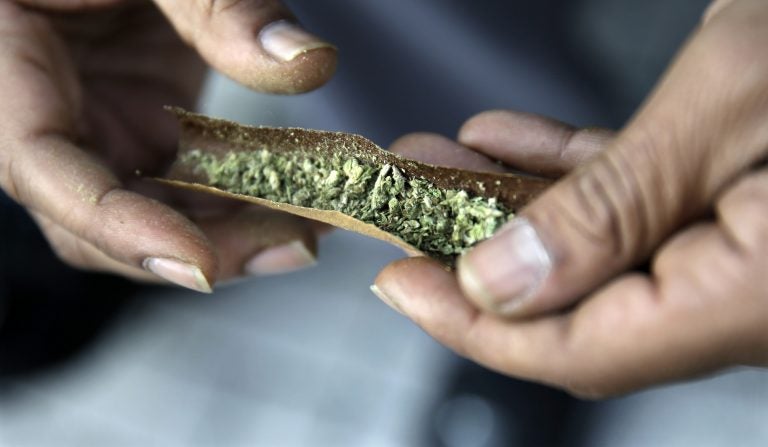Murphy, Democratic leaders now must round up votes for marijuana legislation
Do they have the support of enough Democrats to legalize adult use in New Jersey? That’s just one question arising out of this week’s agreement on legislation.

In this March 21, 2015 file photo, a man rolls a marijuana cigarette as a large group gathered near the New Jersey Statehouse to show their support for legalizing marijuana, in Trenton, N.J. (Mel Evans/AP Photo)
This story originally appeared on NJ Spotlight.
—
Although Gov. Phil Murphy and Democratic legislative leaders have finally reached an agreement to legalize marijuana for recreational adult use in New Jersey, the smoke hasn’t yet cleared enough to see whether they have the votes to pass a bill.
On the heels of what looks to be a more amicable beginning to the annual budget process, the Democratic governor and Senate President Steve Sweeney have settled on the outlines of a bill to legalize cannabis for those aged 21 and older. (Specific wording of the bill has not been released.) The Murphy administration is hoping for a committee vote on March 18 and final passage by March 25.
It will take at least 21 votes to pass the legislation in the upper house and as of last November, before they cut this deal, there were only 20 votes in favor, at best.
“We have a deal,” Murphy said Tuesday. “This was not easy. We’re standing up an entire new industry so not surprisingly it took time.”
The proposal includes a $42 per-ounce flat tax to be levied on cultivators, 2 percent tax revenue for municipalities, an expedited expungement process for people convicted of low-level marijuana offenses in the past, and a five-member Cannabis Regulatory Commission to oversee the industry, among other provisions. The speculation is they are taxing by weight to avoid an additional sales tax, and the $42 per-ounce tax on growers would be passed on to consumers.
Murphy is anticipating that legalization will deliver “thousands of jobs and billions of dollars of economic activity” for the state, given the experiences of states like Colorado and Massachusetts that already have legalized. Indeed, according to data compiled by Whitney Economics and the online cannabis website Leafly.com, the state-licensed cannabis industry gained over 64,000 new employees in 2018 and now employs more than 200,000 full-time workers nationally. Data compiled by the Institute on Taxation and Economic Policy show that tax revenues in 2018 derived from state-sanctioned recreational sales surpassed $1 billion, a 57 percent increase over 2017 levels.
A question of taxes
Murphy’s fiscal year 2020 budget proposal counts on $60 million in new revenue from a tax the state would apply to the sale of recreational marijuana. The governor called that number “modest” and said there would also be a cost to the state of $21 million expense: $9 million in a one-time startup cost and $12 million in ongoing “implementation fees,” although he did not clarify what those fees would be.
It’s not clear when, if passed, the new law would take effect, but Murphy has targeted early 2020.
Legalizing adult-use cannabis has been a priority for Democrats since Murphy’s election as they were unable to make any progress under former Gov. Chris Christie, a Republican. Supporters of legalization cite data showing cannabis arrests cause extensive harm to communities of color and take up significant law-enforcement time and resources. Murphy has repeatedly said that his priority at the deal-making table was administering “social justice” for those incarcerated or otherwise harmed by the nation’s longtime war on drugs.
“I got there via the notion [of] the yawning gaps of social injustice in our state,” Murphy said. He added that there’s a “big expungement piece” to this deal, including a “very robust lookback provision” that will handle clearing the records of individuals convicted of low-level marijuana offenses. “Without it there wouldn’t be a deal,” he said.
At the same time, some lawmakers opposed to full-fledged legalization are pushing to put the issue on the ballot for voters to decide. Assemblywoman Holly Schepisi (R-Bergen) has proposed a referendum on the matter and is in talks with Sen. Ronald Rice (D-Essex) for him to be a potential co-sponsor in the upper house.
“I do not support the legalization of recreational marijuana in New Jersey. I have spoken with Assemblywoman Holly Schepisi on pushing for the measure to be put on the ballot this year because I believe the voters should decide whether recreational marijuana is legalized in this state,” Rice said in a statement.
How many lawmakers will oppose?
Still, it is unknown how many legislators may oppose this attempt at legalization, and legislative leaders are hoping to sell their deal to enough lawmakers to get it passed in both chambers.
“This plan will allow for the adult use of cannabis in a responsible way,” said Senate President Sweeney (D-Gloucester) in a statement. “It will create a strictly regulated system that permits adults to purchase limited amounts of marijuana for personal use. It will bring marijuana out of the underground market so that it can be controlled, regulated and taxed.”
One of the major sticking points for legislators and local leaders alike has been the rate at which marijuana would be taxed. Murphy spent months pushing for a tax as high as 25 percent while Sweeney emphasized he would not go higher than 12 percent. In the agreement reached on Tuesday, adult-use marijuana will be subject to an excise tax of $42 per ounce imposed on cultivators.
Municipalities that have retail shops would be able to impose a 3-percent tax on items sold within their borders, while towns that host marijuana growers would be able to impose a 2-percent tax, and towns with wholesalers could charge a 1 percent tax.
Mayors and municipal officials, however, have long asserted that 2 percent or 3 percent is not nearly enough for them to offset the potential costs of policing and other aspects of implementing legalization. When the bill language is released, many will be looking to see if there’s provision for the Police Training Commission in the Department of Law and Public Safety to reimburse county and municipal expenses for training costs, as was the case in the bill’s previous version.
A weighty question
So why a tax on weight? Politically, it protects Murphy and Sweeney from the insinuation that either gave in on their tax demands. Economically, taxing by weight takes into account the dips in marijuana pricing that states like Colorado and Oregon have experienced since legalizing. That $42 excise tax would remain static whether the ounce cost $300, $150, or less.
Medicinal marijuana would remain untaxed.
Another major factor in the legalization debate has been how to handle expungements for those whose crimes will no longer be crimes, overnight. This disproportionately affects black New Jerseyans who are currently three times more likely to be arrested for marijuana possession than whites, despite similar cannabis use rates.
ACLU data shows that hundreds of thousands of New Jerseyans could be eligible to have their records cleared if this agreement passes, but the process is lengthy and difficult to navigate.
The agreement reached by Murphy and legislative leaders would establish an expedited expungement process for those convicted of low-level marijuana offenses, and it would put into place an electronic expungement process they say will “automatically prevent certain marijuana offenses from being taken into account in certain =areas such as education, housing, and occupational licensing.” Further details will be released sometime this week, but advocates already have flagged a potential problem with the way arrest and conviction data is stored, collected, and entered into computer systems (or left in boxes in basements) that could put a wrinkle in the ease promised by an automated “virtual” expungement rollout.
The complications of expungement
“In as much as we would want this to be automatic it is functionally not possible,” Murphy said of expungement. He noted that many of the issues with processing people through the system will be for the regulatory commission to tease out. “All of us would have preferred an automatic, just one minute after midnight everybody’s expunged [solution] and that is not possible … how that is going to evolve, if you could bear with us, I would appreciate that.”
Although the state will be relying heavily on the newly created commission to work out many details of the legalization and to oversee all license applications for dispensaries, the regulatory body itself has been a point of contention for Sweeney and Murphy. To gain the governor’s blessing, Sweeney and Assembly Speaker Craig Coughlin agreed to grant the governor full authority to appoint a majority — three of the five commission members with the Senate’s consent. The other two members will be appointed by the governor, by recommendations of the Speaker and Senate President.
Additionally, there are provisions in the agreement aimed at creating space in the industry for those who have been impacted by marijuana prohibition, including minority and women-owned businesses, low- and middle-income individuals, and disadvantaged communities.
As the final text of the bill is being edited, stakeholders will be watching to see how their concerns will be addressed including further details on the expungement process:
- Will small-time dealers be included or just those convicted of possession?
- How will the Administrative Office of the Courts be directed to handle expungements?
- Will those applying have their records cleared incur a cost?
- How will marijuana be handled in the workplace?
- What provision will there be for handling intoxicated driving and cannabis-use disorder or addiction?
An opponent’s concerns
Indeed, upon the announcement of the agreement, longtime legalization opponent Sen. Gerald Cardinale (R-Bergen) noted the serious concerns of his constituents and many others across the state.
The principal duty of government “is to safeguard public health and safety. Legalizing marijuana for recreational use is a shameful abdication of that responsibility,” Cardinale said. “In November, New Jersey’s law enforcement community testified that we don’t have the funds, personnel, or technology to identify drugged drivers. There is no breathalyzer for marijuana.”
While New Jersey could see a vote on legalization within a couple of weeks, the issue is also gaining ground on the federal level. U.S. Sen. Cory Booker (D-NJ), who announced his candidacy for president earlier this year, reintroduced his Marijuana Justice Act, which he first introduced in 2017. It would decriminalize cannabis at the national level and leverage federal funds to encourage states to legalize it. Several other presidential hopefuls have signed on to support Booker’s bill.
But even if the New Jersey legalization bill gets passed by both houses in Trenton, implementation could still be a year away.
“Assuming there is not any meaningful amount of recreational sale out of the current medical dispensaries and for a lot of reasons we don’t expect that,” Murphy said, “early next year would be my best guess.”
He added the next step is for himself, Sweeney, Coughlin, and sponsors of the bill in the Assembly and Senate to work to convince others that their plan is worth signing on to.
“We have to get the votes now,” Murphy said. “I’m all in to help them get this over the goal line.”
WHYY is your source for fact-based, in-depth journalism and information. As a nonprofit organization, we rely on financial support from readers like you. Please give today.




